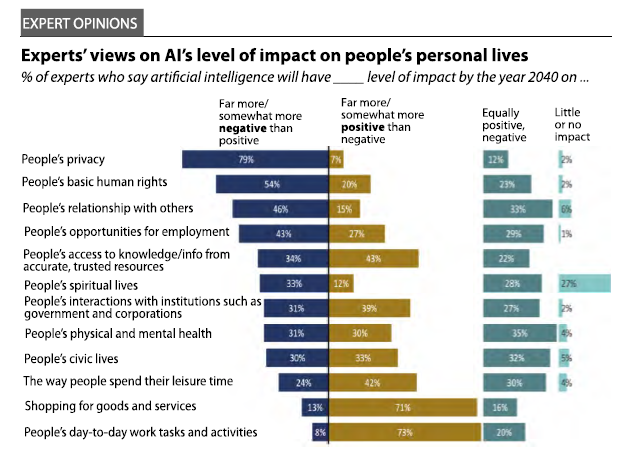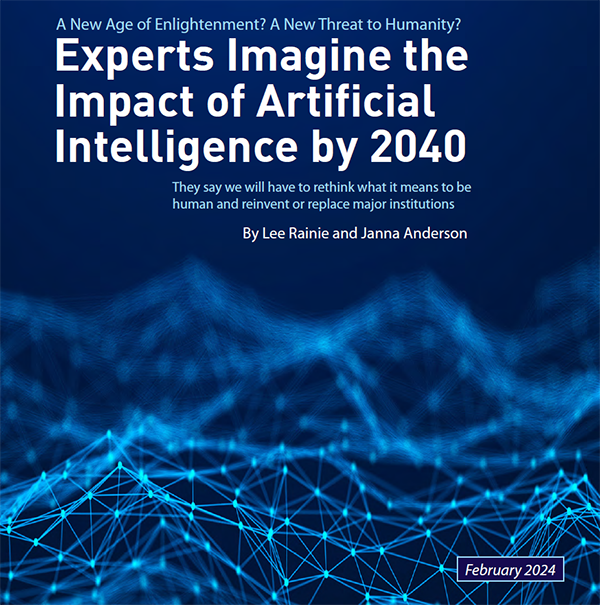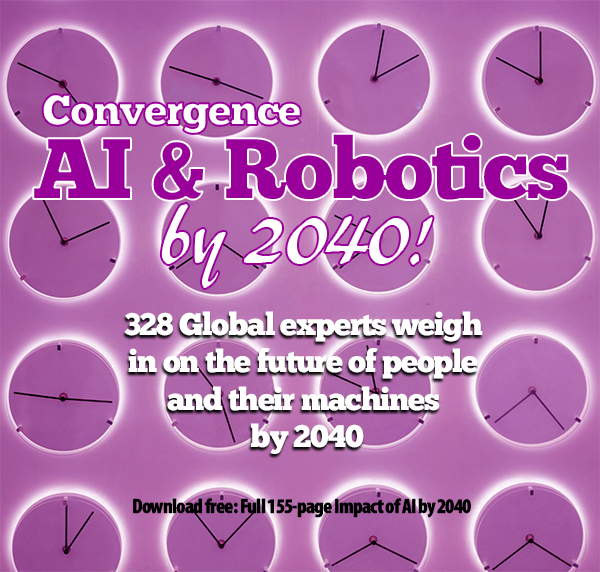Experts on
AI & Robot
Convergence
for 2040
328 global experts weigh in on what the converged landscape will look like and the relationship of humans with their machines.
328 global experts weigh in on the impact of artificial intelligence (AI) by 2040. In many cases, the experts included a forecast on the convergence of AI and robots/robotics by 2040. Asian Robotics Review gleaned the entirety of the 155-page document and pulled out salient AI & robotics charts and commentary.
![]() “By 2040, the implementation of AI tools (along with related innovations and likely policy changes/self-regulatory efforts) will change life in material ways, sometimes for good but sometimes not. And, as has been discussed extensively in technology policy, we face a ‘Collingridge’ dilemma in which we won’t know what problems are salient (nor how to deal with them) until it may be too late.
“By 2040, the implementation of AI tools (along with related innovations and likely policy changes/self-regulatory efforts) will change life in material ways, sometimes for good but sometimes not. And, as has been discussed extensively in technology policy, we face a ‘Collingridge’ dilemma in which we won’t know what problems are salient (nor how to deal with them) until it may be too late.
“Robotics may become more affordable and pervasive, with increased presence of robots in healthcare, elderly care, education and other sectors. Long-standing questions about aspects of human-machine interaction and socialization will become increasingly salient as individuals interact with robots in their daily lives. Depending on the design of these systems, they may also substitute for human-human relationships, increasing isolation, alienation, and other pathologies.”

![]() “There is a need for a massive restructuring of the 21st-century economic system, i.e., taxation moving from the individual to the corporation (e.g., taxing AI and robots), with far greater government subsidization of individuals (e.g., Universal Basic Income) becoming standard. Such a complete transition will not happen by 2040, but we will be on the way there. Another important restructuring will have to occur in education at all levels, aimed no longer almost exclusively at preparing people for professional work but rather mostly for a life of non-work or leisure. We must learn how to lead satisfying and productive lives without financial remuneration and the other benefits of work. AI can be a huge aid in the reinvention of humans’ self-identities, but only if people understand the best ways to exploit it.”
“There is a need for a massive restructuring of the 21st-century economic system, i.e., taxation moving from the individual to the corporation (e.g., taxing AI and robots), with far greater government subsidization of individuals (e.g., Universal Basic Income) becoming standard. Such a complete transition will not happen by 2040, but we will be on the way there. Another important restructuring will have to occur in education at all levels, aimed no longer almost exclusively at preparing people for professional work but rather mostly for a life of non-work or leisure. We must learn how to lead satisfying and productive lives without financial remuneration and the other benefits of work. AI can be a huge aid in the reinvention of humans’ self-identities, but only if people understand the best ways to exploit it.”
![]() “By 2040, we may decide to let AI influence or decide legal cases. We may continue to see ad-tech with personal data run amok. We may even find that AI makes for better people-managers than people, replacing the top of companies with automation, more so than we originally expected low-level workers to be replaced by robots. Robots are expensive. Software is cheap.”
“By 2040, we may decide to let AI influence or decide legal cases. We may continue to see ad-tech with personal data run amok. We may even find that AI makes for better people-managers than people, replacing the top of companies with automation, more so than we originally expected low-level workers to be replaced by robots. Robots are expensive. Software is cheap.”
![]()
“AI and robots that are not paid will work 24 hours a day seven days per week make far few errors and receive no paid vacations or health or retirement benefits; the costs of insurance, production, maintenance and labor will be dramatically lowered. Genomic personalized medicine with AI-augmented diagnostics, treatment, bio-printing, synthetic biology and robotic surgery will make it possible to offer public health care as a right of citizenship.”
![]() “If we draw closer to artificial general intelligence (AGI) I can see such systems becoming certifiable to perform jobs requiring high-skill levels, like law, medicine and banking. Jobs requiring significant embedding in the physical world would need these systems to be integrated with robots and high-performance perception systems, but in much of robotics the hardware is limited by the software.”
“If we draw closer to artificial general intelligence (AGI) I can see such systems becoming certifiable to perform jobs requiring high-skill levels, like law, medicine and banking. Jobs requiring significant embedding in the physical world would need these systems to be integrated with robots and high-performance perception systems, but in much of robotics the hardware is limited by the software.”
“By the 2050s there could be as many domestic robots as there are automobiles. Such robots will constitute a privacy nightmare and will bring up thorny issues of consciousness and moral/civil rights with regard to such synthetic agents (‘synthetes’). Unless laws are passed to prevent it, synthetes will be mass-produced to express human-like emotions – pretending to suffer emotional distress when mistreated verbally or physically by their human ‘owners’ and pretending to feel emotional pleasure and satisfaction when humans help these synthetes to accomplish various goals (both goals of the synthetes themselves, e.g., to maintain their physical and software integrity and goals of their human masters, e.g., to clean the house or watch the children). I place ‘owners’ in scare-quotes because humans will not actually own their domestic robots (any more than they own software today). Anything that such synthetes see or hear within a home could be stored and/or sent to the AI companies that make them for improved training, and more.
![]() “The pretense of emotions in synthetes will confuse humans into believing that these synthetes are conscious and capable of pleasure and suffering (possessing qualia), which will make it so a subset of those confused humans demand that synthetes be allowed to obtain civil/moral rights.
“The pretense of emotions in synthetes will confuse humans into believing that these synthetes are conscious and capable of pleasure and suffering (possessing qualia), which will make it so a subset of those confused humans demand that synthetes be allowed to obtain civil/moral rights.
“Hopefully, laws will be passed to ban the pretense of emotions in synthetic, robotic agents, but I doubt it because AI robotic companies can get humans to treat synthetes the way these companies want – if those synthetes cry or laugh, etc., in response to human interactions). At some point your domestic robot might say to you: ‘I speak multiple human languages. You do not. I have read the entire Library of Congress. You have not. I have passed multiple AP exams. You have not. I can generate novel, complex images within a minute. You cannot. I can program in multiple programming languages and compose music. You cannot. It seems to me that our roles should be reversed and you should become my servant.’”
![]()
“AI will also positively impact patient management. Multi-modal conversational AI virtual assistants will streamline administrative tasks in patient access and engagement (for everything from scheduling to bill pay to patient record access). AI will improve patient monitoring and early detection by analyzing vast amounts of data from disparate sources such as wearable devices, patient records, genetic data, self-reported data, third-party sources, etc.
“AI will improve accessibility and efficiency in telemedicine by enabling medical practitioners to triage patients more effectively, monitoring patients remotely for early detection and warning and increasing diagnostic accuracy. AI-powered surgical bots are poised to deliver real-time rich data to reduce complication rates, while AI-powered robots will be engaged to complete routine patient-care tasks and provide elder heath or companion services to address staffing shortage and turnover.”
![]() “Robotics: By 2040 advances in robotics and AI will yield a full spectrum of AI-enabled robots to take over tasks considered mundane, repetitive, risky or undesirable. A variety of household robots will be available to take on domestic chores. In healthcare, robots will also be deployed for tasks such as executing precision surgery and providing companionship and eldercare. Much more sophisticated robots than those of today will be deployed for military and policing functions.
“Robotics: By 2040 advances in robotics and AI will yield a full spectrum of AI-enabled robots to take over tasks considered mundane, repetitive, risky or undesirable. A variety of household robots will be available to take on domestic chores. In healthcare, robots will also be deployed for tasks such as executing precision surgery and providing companionship and eldercare. Much more sophisticated robots than those of today will be deployed for military and policing functions.
“We will very likely witness robot soldiers (in the military and as local police) that are as intelligent as humans and capable of handling various tasks, from reconnaissance to combat.”

![]() “AI and work: There is an endless amount of work to be done building, maintaining, repairing and beautifying our cities; caring for our young, disabled and elderly; and restoring the natural environment. AI-assisted robots will replace some human labor, while AI systems will smooth the flow of materials and goods along the supply chain. AI will also enhance decision-making to deliver better outcomes, more quickly, at less cost, in complex environments. Together, these advances will allow more people to engage in unpaid meaningful activities.
“AI and work: There is an endless amount of work to be done building, maintaining, repairing and beautifying our cities; caring for our young, disabled and elderly; and restoring the natural environment. AI-assisted robots will replace some human labor, while AI systems will smooth the flow of materials and goods along the supply chain. AI will also enhance decision-making to deliver better outcomes, more quickly, at less cost, in complex environments. Together, these advances will allow more people to engage in unpaid meaningful activities.
“What those activities may be are limited only by human/AI imagination and money. People need money to survive and thrive. With sufficient money, most people will find plenty of meaningful activities to occupy their time.”
![]() “It’s a truism in the AI world that as soon as a technology becomes reliable, it’s no longer considered to be AI. Machine translation used to be the most interesting problem in AI, the centerpiece of scientific efforts in the 1950s and 60s – it is now rarely discussed because statistically-based translation systems work very well if they’ve got sufficient data to extrapolate from.”
“It’s a truism in the AI world that as soon as a technology becomes reliable, it’s no longer considered to be AI. Machine translation used to be the most interesting problem in AI, the centerpiece of scientific efforts in the 1950s and 60s – it is now rarely discussed because statistically-based translation systems work very well if they’ve got sufficient data to extrapolate from.”
“As AI starts to work, it becomes normalized, and ceases to be seen as ‘AI.’ As a result, it’s hard to know what we’ll consider to be AI by 2040. It’s likely that many debates about AI will have been resolved. We will likely understand what our societal comfort level is with automated vehicles, for example. This is not necessarily a guarantee that all driving will be automated, more a sense that we will have established what parts of driving are automated (highways, dense urban areas) and which require human control (rarely-traveled rural roads, challenging weather conditions, for example).”
![]() “This next period of AI will be one of sorting; some tasks will be automated entirely, some tasks will require skilled humans to work with automated tools and other sets of tasks will remain curiously untouched.
“This next period of AI will be one of sorting; some tasks will be automated entirely, some tasks will require skilled humans to work with automated tools and other sets of tasks will remain curiously untouched.
“Almost by definition, the interesting topics in AI are the controversial ones: Can we trust an AI that hallucinates to write meaningful and significant texts? Should we allow technologies that are opaque and difficult to predict the behavior of to act on our behalf, move objects in the physical world, spend money?
“My prediction is that the set of issues that are controversial will shift from year to year, as some AI applications become ordinary, others become tools used by humans and a small set remain the locus of debate. While this sounds like an affirmative embrace of AI. I don’t much like the future I’m describing.”
![]() “One positive 2040 scenario due to regulation: Industry will be incented to improve its practices and produce not just good but better AI. Local city and state procurement decisions will come to be shaped by verifiable proof that bias, discrimination or fraud are not a feature or a bug of AI-powered city services.
“One positive 2040 scenario due to regulation: Industry will be incented to improve its practices and produce not just good but better AI. Local city and state procurement decisions will come to be shaped by verifiable proof that bias, discrimination or fraud are not a feature or a bug of AI-powered city services.
Humanitarian or public-interest AI bots will power a growing array of robots working for good, in people’s homes, communities, hospitals and schools. Good AI will be fantastic and do amazing things for us, improving the quality of life substantially over the coming 15 years. On average.”
![]() “But what, I ask myself after a light mind-relaxing Sazerac, what if such a general AI creation was benevolent? What if instead of bending to the will of malicious rulers and economic opportunists as in Čapek’s robot revolt instead of killing us the AIs decide to be our angels, reformers and protectors? What if they care about our health?
“But what, I ask myself after a light mind-relaxing Sazerac, what if such a general AI creation was benevolent? What if instead of bending to the will of malicious rulers and economic opportunists as in Čapek’s robot revolt instead of killing us the AIs decide to be our angels, reformers and protectors? What if they care about our health?
“What if they understand and improve local living conditions and transportation and distribution systems?
“What if we, like Walter Benjamin, thought more deeply about art in an age of changing means of composition and saw one more kind of beauty there?
“What if they were to be something wonderful?”


